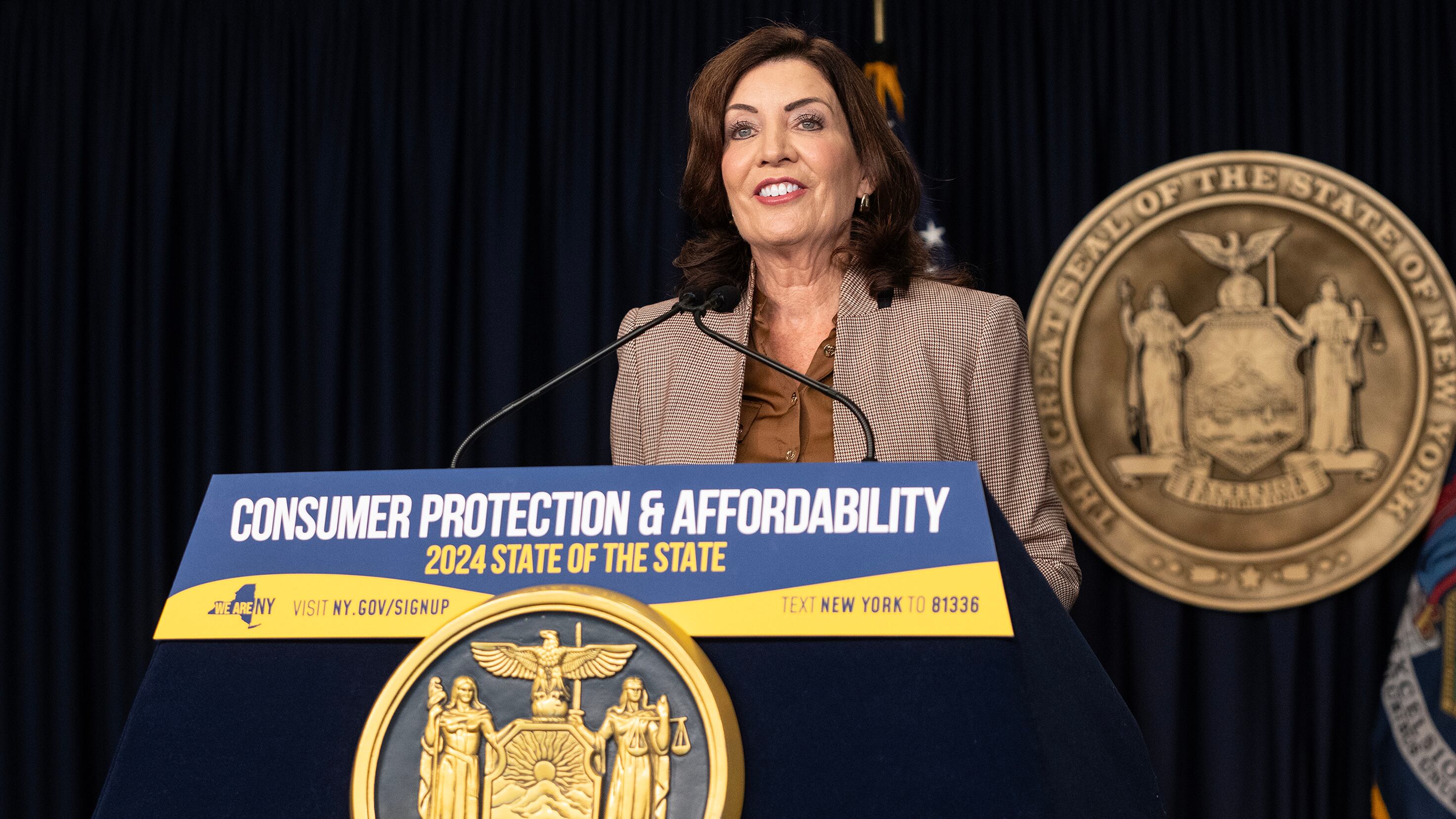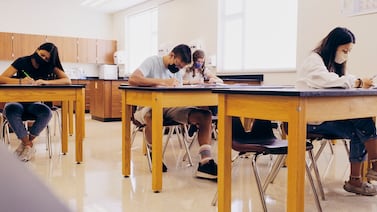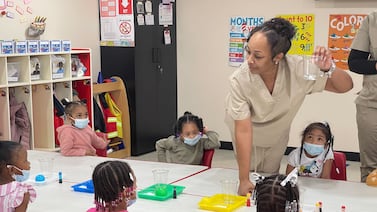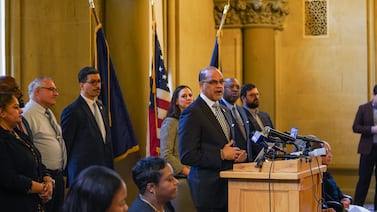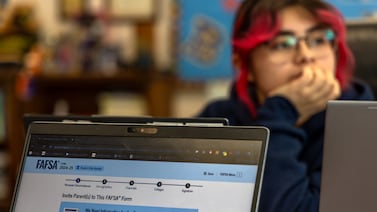Sign up for Chalkbeat New York’s free daily newsletter to keep up with NYC’s public schools.
Improving student mental health services, urging school districts to adopt new literacy curriculums, and expanding access to the state’s public colleges and universities are among the education initiatives that New York Gov. Kathy Hochul hopes to accomplish this year.
Hochul outlined her priorities for the year on Tuesday during her annual State of the State address — a speech that governors deliver each January. She pointed to a series of key policy proposals, including those that could impact children across the state, while emphasizing the need to strengthen public safety and mental health services in particular.
But some critical education issues were absent from the more than 200 initiatives outlined by state officials on Tuesday. Hochul noted her plans for addressing “the toughest fiscal issues” facing the state — including providing care for the influx of asylum-seeking and other migrant families — would come when she presents her budget proposal next week.
Here are the education policy highlights from Hochul’s State of the State address:
More school-based clinics and limits on social media
On Tuesday, Hochul referred to mental health as “the defining challenge of our time,” blaming pandemic isolation and the “toxic algorithms that govern social media” for fueling a crisis among the state’s young people.
“When schools closed during the pandemic, kids turned to social media to stay connected with friends and families,” she said. “But a darkness lives on those platforms.”
Hochul’s proposed initiatives would take a two-pronged approach to addressing student mental health — bolstering access to resources at schools, while seeking to limit the potential negative impacts of social media.
The governor wants to make on-site mental health clinics available to any school that desires one. The clinics offer students a place to receive services from mental health professionals. The proposal would build on past efforts by her administration to increase the availability of such clinics. In November, Hochul announced more than $5 million had been awarded to support 137 school-based mental health clinics across the state, including more than 80 at high-needs schools.
Hochul has also called for expanded funding for youth-driven peer support programs, as well as intensive care programs that support students who need daily treatment.
Become a Chalkbeat sponsor
State officials, including Hochul, have also pushed for legislation that would impose restrictions on how social media companies interact with minors. Under two proposed bills, social media companies would be unable to offer algorithmically devised “addictive” content to minors by default, while giving parents the ability to block access to the sites between certain hours, and limiting the companies’ ability to collect and sell the personal data of minors.
Guaranteed college admissions for top students
To expand access to higher education across the state, Hochul has proposed automatically admitting top-performing high school students to the state’s public colleges and universities.
Under the proposal, students graduating in the top 10% of their high schools would be guaranteed admission to one or more selective colleges in the State University of New York system. A similar proposed program at City University of New York campuses would further expand access.
Other higher education priorities included increasing completion rates of federal financial aid applications, broadening outreach around food stamp benefits at public colleges, and driving up voter participation on college campuses.
A reading curriculum shakeup
During her Tuesday speech, Hochul referred to her recently announced plan to change how students across the state learn to read. The governor hopes to move schools toward embracing the “science of reading,” an established body of research about how children learn to read.
As part of her plan, the state will support programs that emphasize phonics lessons, which explicitly teach the relationships between sounds and letters and are backed by research.
Hochul has also proposed investing $10 million to partner with the state’s teachers union, training 20,000 educators and expanding efforts from the city and state university systems to help educators learn about the science of reading.
New York City has already adopted its own sweeping literacy curriculum mandate that is largely in line with Hochul’s proposal. Curriculum overhauls can be difficult to enact, and it remains unclear whether the governor’s proposal will prompt significant changes statewide.
Swimming safety, food insecurity, and other initiatives
Outside of the classroom, Hochul has also prioritized programs that seek to support families and young people across the state — including efforts to prevent drownings, tackle food insecurity, and expand access to child care.
State officials said drownings have reached record highs in recent years, becoming one of the leading causes of death among children. Racial disparities have persisted in drowning deaths, with Black children experiencing drowning death rates roughly three times higher than their white peers, according to the U.S. Centers for Disease Control and Prevention.
Become a Chalkbeat sponsor
To address this, the state will provide funding to renovate and construct pools in high-need neighborhoods, build “pop-up pools” during the summer months, and offer reimbursements to municipalities for costs related to hiring and staffing lifeguards, among other initiatives.
The city has also aimed to expand access to swimming facilities and programs, with a “floating pool” set to open next year.
The state has also opted into a federal meals program that provides families who usually receive free meals at school with funds to help cover food costs during the summer. That program is estimated to provide more than $200 million in federal benefits to about 2 million children in the state, officials said.
Hochul also called for continued investments in child care programs, noting the state will continue to use underutilized federal pandemic funds to provide grants to help such programs retain and hire staff.
Julian Shen-Berro is a reporter covering New York City. Contact him at jshen-berro@chalkbeat.org.


